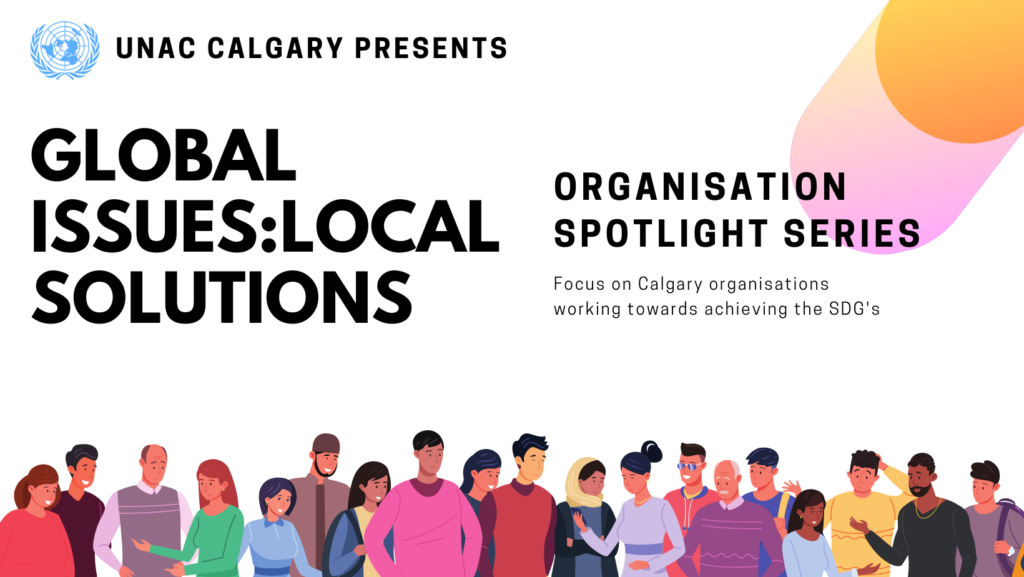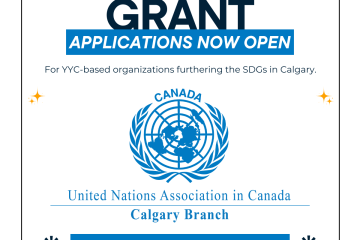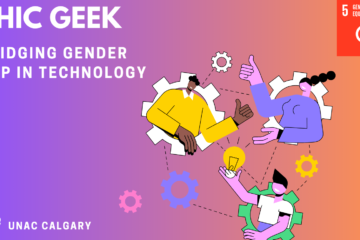Part of Blog Series: Global Issues, Local Solutions – Calgary Organizations Spotlight

The Sustainable Development Goals (SDGs) of the United Nations focuses on global issues but aims to solve them through the local solutions available in each and every community. With this perspective in mind, we at United Nations Associations Canada – Calgary bring to you a series of blogs that focuses on how local organizations in Calgary work to address global concerns.
By: Josephine Mary
In this second blog on the spotlight series, we are talking about Vibrant Communities Calgary and their initiative against fighting poverty, “Enough For All”. I had the opportunity to meet Meaghon Reid, the executive director of the organization for an in-depth conversation on the work they do and how to be a part of it. This blog is an overview of the discussion with key insights from the conversation.
What Does Enough For All (E4A) Do?
Enough For All is a community-owned strategy for reducing poverty in the city of Calgary. In a nutshell, the team at Vibrant Communities Calgary try everyday and work collaboratively with various partner organizations in various sectors to change the systems that hold poverty in place. Through their research and initiatives, they focus on systems-change across domains like affordable housing, food security, income support, etc.
The 10 Levers of Change: What Are They?
E4A focuses and works on 10 levers of change. These levers are focus areas like “financial empowerment”, “literacy”, “housing”, “food,” etc., that have an influence on everyday living, income and poverty. These 10 areas are interconnected and affect one another. As Meaghon explains, “For example, there has been a housing crisis in the city with as much as a 30% increase in the rental rates. It impacts the spending capacity of the people and leads to food insecurity. When there is food insecurity it directly impacts the ability to learn for kids which affects the literacy rate”. Thus, each and every lever is interconnected.
Where Does Poverty Start: Exploring The Root Causes Of Poverty?
Enough for All aims to explore what forces people into poverty and the systems that keep poverty in place. This could be for a variety of reasons.
With a focus on uncovering the multiple layers of community well-being in the city, recently, the agency published Beneath the Surface, which highlighted that Calgary is the second most unequal city in the country after Toronto. There is a huge gap between higher income earners and people living in poverty in Calgary. They focus on examining these systems and possible solutions.
An important aspect of their work is highlighting the voices of lived experience. Sometimes the decisions for people living on low incomes are made by people who might not be aware of the lived experiences of those navigating social services. The City of Calgary has been doing good work to incorporate lived experience and to diversify decision-making so everyone’s voices are represented and understood.
Talking About the Income Difference Between the Local and The Racialized Communities: Why?
Often a main reason for the income difference with racialized communities, immigrants and Indigenous communities is racism, Meaghon notes. Many racialized people, including newcomers and Indigenous people often face discrimination and education and credentials from other countries are not valued on par with Canadian credentials.
Poverty In the Local Canadian Communities: How and Why?
We discussed income differences and poverty within racialized and Indigenous communities and what causes the poverty in the local Canadian communities. She explained poverty can be traumatic and can be intergenerational. For instance if you are raised in poverty you may have fewer opportunities and resources and this can lead to few opportunities and resources for your children.
Community Partnerships and Impact
E4A works with many community organizations and social service agencies towards advancing policy change. Community support and partnerships have been the backbone of E4As collective strategy for fighting poverty. The partnerships include non-profit organizations, companies, local businesses and people from different fields with different voices.
E4A works with our partners to advocate for policy change and bring about positive change. If there is an issue that needs to be addressed, E4A will collaborate with partners to share resources and coordinate advocacy. The partnerships enable E4A to bring a collective voice, spread awareness, and influence governments and policymakers.
They also work with research partners to highlight issues and solutions. In fact, right now they are working with the University of Calgary on examining social disorder. The idea is to make people see issues and how we can make changes that matter.
The Work With Food Security
Meaghon shares that before the pandemic there were 64 emergency food providers, like food banks and community pantries, but after the pandemic the numbers have gone up to about 200. She also shared that Alberta, though known for its resources, is one of the most food-insecure provinces in the country.
The agency has been working to highlight issues related to rising food costs and evidence-based information and solutions. She notes the solution to food security is not more food banks, it’s more income.
Do We Have Enough Support From Educational Institutions For Development?
Less than half of kindergarten-age children in Alberta are developing appropriately in five key areas of development. This causes a multitude of problems as they grow up.
Research shows that 75% of children who do not overcome early literacy problems struggle throughout their life. Enough for All is proud to support Left Unread, a movement declaring that our children deserve the opportunity to realize their full potential.
Meaghon also mentions the importance of students learning civic participation, like how to get involved and spark change through voting.
What Can You Do As An Individual/Organisation/Community?
Meaghon explains one of the best poverty reduction strategies is to check on your neighbor. A recent study by the Alberta Health Services shows that one of the biggest causes of premature death is isolation and loneliness she shares. Anyone who wants to work towards eradicating poverty can start with their neighbors by just checking on them.
Next as an individual, one can visit the enoughforall.ca for more information on the issues and solutions.
Organizations can become Enough for All Champions to share their voice and push for better policies and share resources.
Also check out the Poverty Profiles released by E4A last year. Learn about how poverty is impacting your community.
Closing Notes
As we reach the end of the article, I would like to summarize the conversation in five key takeaways towards fighting poverty in our city.
- The causes of poverty are interconnected. To fight poverty, we need to work collectively across multiple dimensions.
- One in five Albertans is food insecure and this can impact people in multiple ways. Income-based solutions are the best way to tackle food security.
- It’s important to examine the systems that cause and keep poverty in place.
- Income and poverty go hand in hand.
- Poverty reduction efforts should start with your neighbor and your community.


